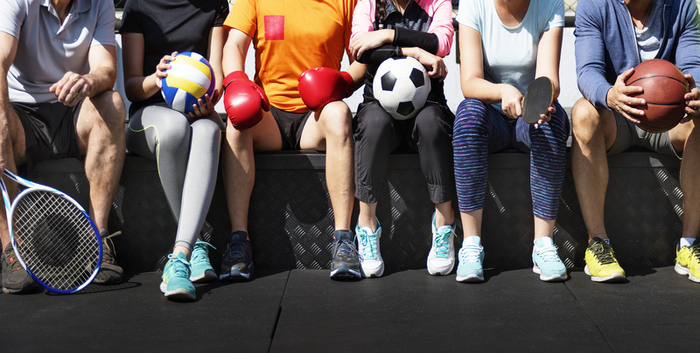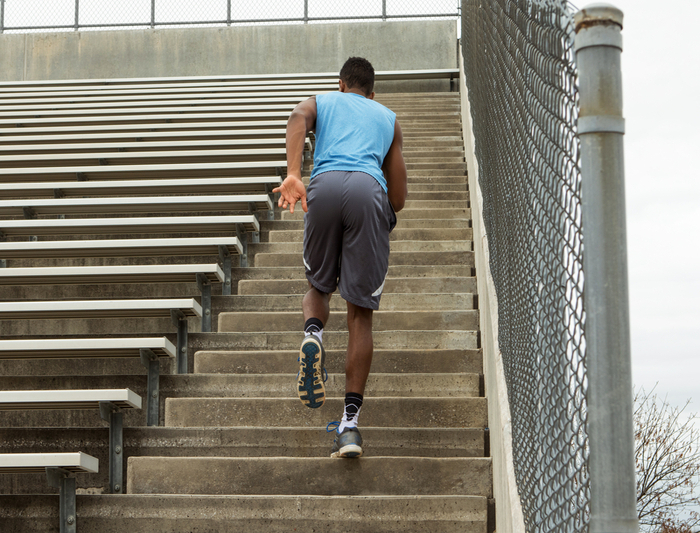- Calls to this hotline are currently being directed to Within Health or Eating Disorder Solutions
- Representatives are standing by 24/7 to help answer your questions
- All calls are confidential and HIPAA compliant
- There is no obligation or cost to call
- Eating Disorder Hope does not receive any commissions or fees dependent upon which provider you select
- Additional treatment providers are located on our directory or samhsa.gov
When Can I Go Back To A Sport After Recovering from an Eating Disorder?

Eating disorders can have a substantial effect on every aspect of your health. So before returning to certain activities, like playing sports, you must make sure you’ve made a sufficient recovery, mentally and physically.
Consulting with your physician or therapist is important. They will be able to guide and gauge your individual case. But with proper care and attention, it may be possible for you to return to a workout routine after recovering from an eating disorder.
Key Things to Consider
Since most eating disorders take such a toll on the body, it’s important to ensure that returning to sports won’t lead to further physical complications.
And since many eating disorders are driven by a fixation with body image—which often manifests as compulsive exercise—making sure you’re not at risk of being triggered by a workout is also paramount.
Physical Factors
Physically, eating disorders can wreak havoc. A few conditions to look out for when considering whether you’re ready to return to sports include:
- Muscle weakness
- Dizziness
- Low body weight
- Low or high blood pressure
- Heart arrhythmia
Attempting to do too much too soon can exacerbate things by causing you to use up more muscle mass. There is also the risk of a more direct injury, such as a result of falling over from dizziness or fainting while moving around.
In females, low body weight also presents the risk of developing amenorrhoea, or the absence of menstruation. Aside from leading to hormonal complications, this condition can cause bones to thin, making it easier to get injured while exercising. [1]
Social and Emotional Factors
It is also necessary to consider emotional readiness before returning to sport.
Issues with body image are common across sports in general, leaving many athletes to struggle with eating disorders. A strong support system can help keep you on track, and work on building confidence in a healthier way.
The level of sport in consideration is also relevant. A person recovering from an eating disorder who’s looking to join friends in a casual game is different from someone returning to a more competitive league, with higher pressure to perform.
Having open and honest communication with any trainers, teammates, and coaches, as well as friends, family, and loved ones, can help with this aspect of recovery.
Signs of Eating Disorder Recovery
Recovery from an eating disorder can be hard to assess. The process is gradual, and hardly ever linear.
Along the way, you may excel at one aspect of recovery, but struggle with another; experience rough patches; or even go through phases of regression. Still, there are some signs to look out for which may generally indicate an improvement in your condition. [2, 3]
More Regular Hunger Cues
Eating disorders of all kinds tend to have a heavy impact on the body’s natural hunger cycles. The mind is a very powerful tool, and can trick the body into wanting food, or suppressing feelings of hunger. Eventually, the stomach may grow or shrink to match these impulses.
Once the body and mind have started to heal, the body may return to more regular hunger cues. These vary from person to person, and can feel like anything from a rumbly stomach, to low energy, to a shift in moods.
It can be difficult to tune into your body and understand when you’re actually feeling hungry. But paying attention to natural changes around the times you eat, or even the times of day you’re usually hungry, can help you assess when your body wants food, and when you’re getting back on track.
Eating in Front of Others
Many eating disorders stir up feelings of guilt and embarrassment around eating habits, which can lead to behaviors like hoarding food, sneak-eating, and avoiding social situations that involve meals.
If you’ve struggled with these symptoms as part of your eating disorder, your path to recovery may include feeling more comfortable with eating in front of others again.
Not Feeling Cold
Eating disorders often have a large effect on metabolism.
The specifics depend on the type of disordered eating behaviors you’re reckoning with, but if your metabolism has slowed down due to your condition, you may frequently feel cold as a result.
If you’re no longer shivering, looking for extra layers, or turning up the heat at times when others are feeling comfortable, it could be a sign of positive progress.
Improved Skin, Hair, and Nails
The impact eating disorders have on nutrition can cause a number of physical effects. Some of the most common include the deterioration of skin, hair, and nails.
Hair can fall out, skin can dry up, and nails can become discolored or brittle as an eating disorder progresses. But with the steady institution of a nutritious diet, these aspects of health often return.
Improved Energy Levels
An increase in energy is perhaps one of the more difficult signs to spot when recovering from an eating disorder.
Energy levels generally increase gradually over the course of recovery, making it difficult to notice if there’s been any change at all. Still, you may realize one day that activities that previously tired you out are no longer causing a problem. That, and similar signs of a returning vigor, can be an indicator of your returning health.
Assessing Your Eating Disorder Recovery
While these signs may act as good general indicators of improvement, they are far from the only ways that recovery shows up.
Just as each eating disorder case is different, so is the recovery from these conditions. The process is an exceptionally individual and intimate experience. And the best way to assess your progress is by consulting a healthcare professional.
Doctors, therapists, and other experts are trained to look for all the nuances of recovery, and will also be mindful of any additional pitfalls of returning to sport too quickly.
Even if you’re feeling physically and mentally better, you should consult with a trusted physician before you make the decision to get back in the ring.
How to Start Exercising Again After Recovery from an Eating Disorder
In many ways, getting back into sports after recovering from an eating disorder is similar to getting back into any routine after taking some time off. The most important thing is to ease back into it, regardless of the level of sport you’re aspiring to.
Starting out with more gentle movements such as yoga, Tai Chi, or nature walks can be a good way to start moving again. And practicing these—or other types of movement—with a class can also help set a healthy pace, and help you cultivate mindfulness.
Some experts warn against starting out with more intensive practices, like running. And focusing on numbers, compared to feelings, as well as tracking progress closely through an app can also indicate unhelpful thoughts and behaviors.
Once again, consulting with a trusted physician will give you a better idea of how and when to start exercising again.
Resources
- Giordano, S. (2004). Risk and supervised exercise: the example of anorexia to illustrate a new ethical issue in the traditional debates of medical ethics. Journal of Medical Ethics; 31:15-20.
- 9 Physical Signs of Full Recovery. (2022, March 31). Follow the Intuition. Accessed January 2023.
- What does recovery look like? What are the signs? What to look for? (2022). Eating Disorders Families Australia. Accessed January 2023.
The opinions and views of our guest contributors are shared to provide a broad perspective of eating disorders. These are not necessarily the views of Eating Disorder Hope, but an effort to offer discussion of various issues by different concerned individuals.
We at Eating Disorder Hope understand that eating disorders result from a combination of environmental and genetic factors. If you or a loved one are suffering from an eating disorder, please know that there is hope for you, and seek immediate professional help.
Edited on March 29th, 2023
Published on EatingDisorderHope.com

